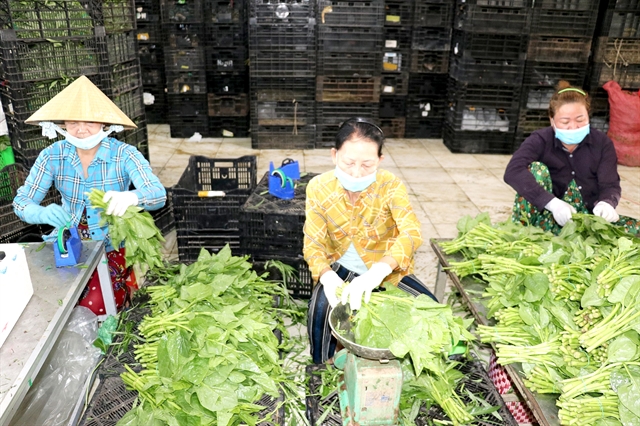 Society
Society

 |
| Workers process vegetables at Hoà Thạnh Safe Vegetable Co-operative in Tiền Giang Province’s Gò Công Đông District. – VNA/VNS Photo Hữu Chí |
TIỀN GIANG – Tiền Giang Province is enhancing vocational skills for rural labourers to help them have stable jobs and incomes.
The Cửu Long (Mekong) Delta province plans to provide vocational training for 4,000 rural labourers this year, taking the rate of trained labourers to 57 per cent by year-end, according to its Department of Labour, Invalids and Social Affairs.
It aims to increase the rate to 75 per cent in 2030.
It also targets up to 90 per cent of labourers will get a job after learning vocational skills.
The rate of trained rural labourers in the locality reached 55 per cent last year.
Lý Văn Cẩm, director of the department, said to meet the targets of providing vocational skills for labourers, the department has set up a plan to provide vocational skills with a short term training of less than three months for labourers and submit it to the province People’s Committee for approval.
The department has instructed the People’s Committees of districts, cities and towns, and vocational training establishments to implement the plan promptly and effectively, he said.
It has made a list of occupations whose labourers will be assisted to learn vocational skills and has submitted to the provincial People’s Committee for approval.
It has updated and developed new vocational skills curricula which suit the conditions of each locality and the demands of labourers.
Vocational training establishments have to set up their plans to recruit and provide vocational training at all levels of trainees, implement advocacy activities about learning vocational skills, and provide occupation consultancy for labourers, he said.
They should increase providing vocational skills in combination with creating jobs for labourers, and connect with companies to enhance vocational skills for labourers, he said.
The province has 26 vocational training establishments, including three colleges, three intermediate schools, six centres for vocational education–continuing education, two vocational training centres and 12 vocational education establishments.
The 26 establishments recruited 11,596 students last year.
They provided vocational skills suited to the conditions of each locality and created suitable jobs for each kind of labour groups.
Nguyễn Thái Duy, director of the Gò Công Đông District Centre for Vocational Education–Continuing Education, said the centre has co-operated with the district’s relevant agencies to review the vocational skill demands of labourers to set up a training plan that is necessary and effective.
The centre provides vocational skills that meet market demand, provides job consultancy, and introduces and creates jobs for labourers, he said.
It organised six courses on non-agriculture vocational skills for 210 labourers and 12 courses on agriculture vocational skills for 390 labourers last year.
The Tiền Giang College regularly provides short-term vocational skill training in technology and transport sectors for more than 2,700 students.
The providing of vocational skills for labourers in the province has helped many have stable jobs and escape poverty.
Trần Thị Kim Anh in Cai Lậy District’s Phú An Commune has learned cooking from a class organised by the district Bureau of Labour, Invalids and Social Affairs.
The course had 35 trainees and lasted for more than a month.
“Participating in the cooking class, we are taught to cook basic and advanced dishes. After the class, the trainees can cook dishes for their family’s parties and open a food business to increase income,” she said.
Cai Lậy District has strengthened providing farming techniques and job consultancy for labourers and assisted them to access soft loans to grow crops and breed animals.
It has attracted the investment of companies and created jobs for local people.
The rate of labourers provided vocational skills in the district is 77.8 per cent.
Cái Bè District has organised many vocational skill courses for rural labourers and most of them have stable jobs after participating in the courses.
The district has 145,000 trained labourers, accounting for more than 75 per cent of its total labourers.
The province has organised job transaction sessions to introduce jobs for labourers, and assisted them to access soft loans for agriculture production, businesses and services, and go to work overseas.
It assisted 19,000 labourers to get jobs last year, 5.6 per cent more than its target, according to the department.
The province targets to create jobs for about 20,000 labourers and assist 550 labourers to work overseas this year, according to the department. – VNS




